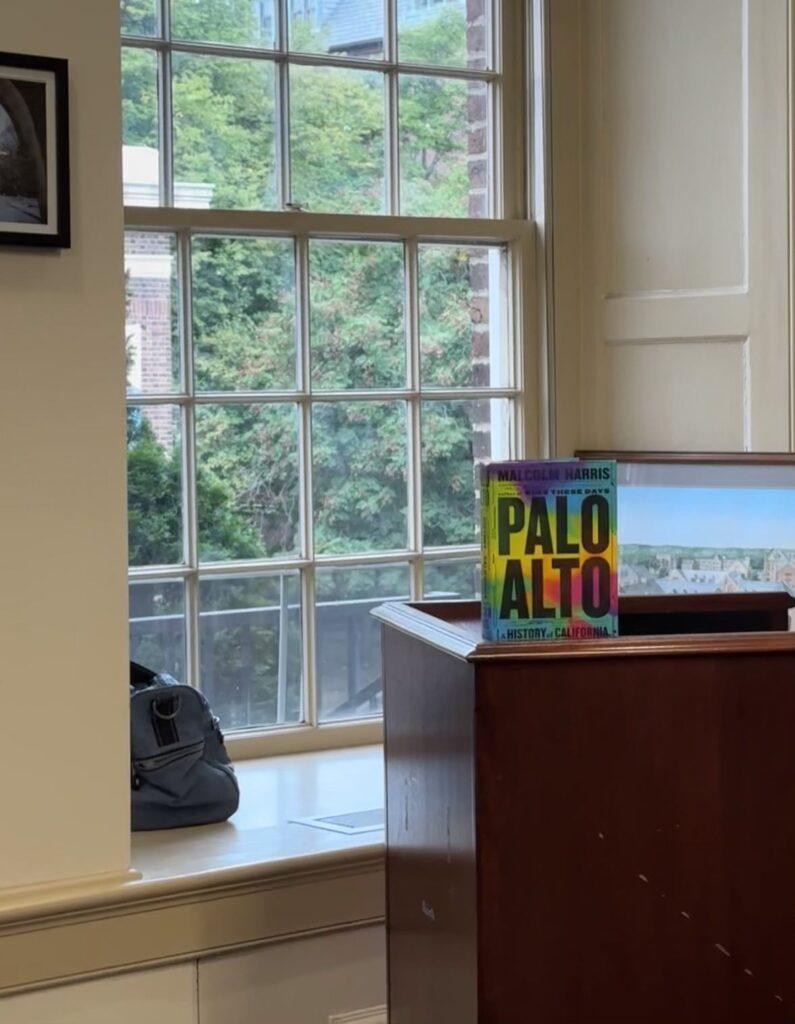Journalist, editor and critic Malcolm Harris discussed the relationship between Palo Alto, Calif., and its larger role in the tech industry, labor movements and U.S. capitalism.
The Georgetown Global Cities Initiative hosted the event on Aug. 29 in Old North. Katherine Chandler, an associate professor of culture and politics, interviewed Harris, while Beeck Center fellow Katie Wells moderated the discussion.
Harris is a national bestselling author, whose works include “Kids These Days: The Making of Millennials” and the recent “Palo Alto: A History of California, Capitalism, and the World,” the latter of which was the focus of the conversation. Harris is also an editor for The New Inquiry, a progressive cultural and literary magazine.
Harris’ novel focuses on how Palo Alto served as a springboard for key political movements and moments in American history such as the Chinese Exclusion Act, the Black Panther protests and labor strikes.
Chandler started the conversation by emphasizing the interdisciplinary importance of Harris’ work “Palo Alto,” which examines the city’s role in the development of Silicon Valley, specifically looking at the founding of Stanford University.
“What is so important about this book is that it really reminds us of the ways that technology is imbricated with histories of militarism, histories of racism, histories of sexism, histories of colonialism, histories of sexism,” Chandler said at the event. “All of those relationships are directly embedded in university.”
Stanford’s role in Silicon Valley as an institution of higher education and development has aided the rapid and often violent development of capital, according to Chandler.
“The consequences of ‘move fast and break things’ are not just, like, some guy makes millions and billions, trillions of dollars,” Chandler said. “There are literally dead bodies that are resulting from this.”
“Palo Alto” touches upon the violent effects of capitalism, including the 2014 suicide epidemic of workers at Apple’s largest iPhone factory in China and the genocide of indigenous peoples in California by Anglo-Saxon settlers.
The relationship between labor and capital also extends to gender, according to Harris.
“California didn’t have a gender parity until the 1960s, until the post-war era of migration and settlement,” Harris said at the event. “The people who were moving to California were not women. It was men who were going out there to make their fortune and come back.”
Women played a crucial part in the development of Palo Alto and Silicon Valley, but their role is often silenced or reduced, according to Harris.
“We don’t talk about the women who literally built the computers because they were wiring the boards in their kitchens,” Harris said.
For example, the Bletchley Park codebreaking operation during World War II consisted mostly of women, but they were asked to describe their jobs as secretarial. Adele Goldberg, a computer scientist, made the programming language that inspired the first Apple computer.
Harris said that because the tech industry is so focused on the accumulation of capital, inventors often do not have agency over their creations.
“Inventors don’t end up being in charge of their technology,” Harris said. “What did Steve Jobs invent? The answer is nothing.”
Harris said that race will be an important factor when looking at the future of Palo Alto and its relationship with capitalism and technology.
“Silicon Valley, a great labor market, remains incredibly racially segregated by technical occupation,” Harris said. “It’s used very instrumentally to create different groups of employment and create segregated workplaces in the interest of driving down wages.”
“Racially segregated workplaces are a part of California technology, the workplace technology, as much as computers,” Harris added.
“Palo Alto” started as an autofiction detailing the history of Palo Alto and Harris’ time growing up in the city. Harris said he decided the novel would work better as nonfiction after realizing the complexity of the book’s subjects.
“I wrote this first chapter and it’s three times as long as it’s supposed to be, I think every chapter is going to be three times as long, and I also want to cut all this stuff about me,” Harris said. “But I think it’s better for the book.”















